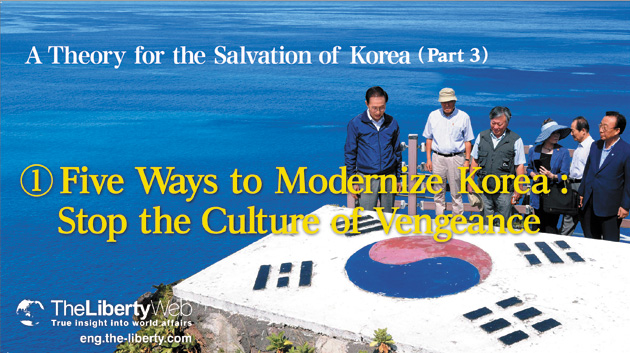A Theory for the Salvation of Korea (Part 3)
Five Ways to Modernize Korea: Stop the Culture of Vengeance
Korea’s pre-modern methods include:
- Arresting previous presidents and banishing them from society
- Neglecting the rule of law
These are the ways to modernization
- Using the election system with an understanding that it’ll realize a peaceful regime change
- Raising the awareness of importance of lawfulness with stronger punishments for crimes
The Liberty has organized five primary points for a presentation on how to help Korea become a modern nation both nominally and virtually.
For Korea to modernize, it must end the “culture of vengeance” where a new regime can banish the predecessor after it changes leadership. Most of the presidents in Korea’s history have not been able to live in peace at the end of their terms. The government has not had the potential to stabilize, nor have the citizens been able trust to it.
This culture of vengeance may still be seen in some Asian countries such as Communist China, Cambodia, and wherever military dictatorships exist. However, in developed nations such as the United States, England, and Japan, it doesn’t occur. If one were to try and to look for cases in Japanese history where a regime change destroyed an entire clan, one would have to travel way back in time to the Warring States or the Genpei War era.
In the interview, Mr. Mizuma analyzed why Ex-President Lee Myung-bak landed on Takeshima in August of 2012 before his term ended:
The Joseon era tradition of leaving no sign of the achievements of a predecessor remained even after Korea’s democratized. President Lee Myung-bak probably built a monument on Takeshima because the next president wouldn’t be able to touch it. If some group tried to destroy the monument on the island, the Korean citizens would have expressed their sheer outrage. I think he did it to ensure his own safety.”
To erode the authority of a predecessor only to display one’s power in place of it is selfish and narrow-minded. That way does not admit or allow for any differences of opinion.
Punishing Pro-Japanese Acts With Ex Post Facto Law
When a regime in power makes rulings as it likes, it doesn’t have any respect for the rule of law. Since the Joseon era, Korea has been acting in this regard.
Officials with power took people’s lands and properties as they wished, and executed citizens who revolted without trial. Bribery was rampant, and government positions were bought and sold freely. Even in modern Korea, everything from university professor positions to military star ranks are now being bought and sold (based on Che Kiho’s “2000 Years of Korean Corruption”).
Furthermore, even today there’s little consciousness with concern for the protection of private property. For instance, on the 8th of January, the high court in Seoul announced that the state would confiscate land (approx. 100 million yen worth), which previously belonged to Mr. I He-sun who the Japanese government appointed “Marquis” during the Japan-Korea Annexation Era.
The court based its ruling on a “special law to redeem pro-Japanese collaborator’s property” that the Roh Moo-hyun administration made in 2005. This law called for the confiscation of property from Korean citizens that the state identified as Pro-Japanese collaborators from the Japan-Korea Annexation Era. The new rule covered their descendents, too. This policy showed the obvious,reckless disregard for private property in Korea, but it also openly discriminated against a specific race (Japanese), with an ex post facto law (note) that completely ignored the very idea of lawfulness. It totally lacked common sense.
For the Rule of Law to Take Hold
The rule of law, starting with the West, was constitutionally established in the 18~19th century, but it is said that it had been widely recognized from before that time. In Japan as well, the spirit of rule of law had already taken hold of the country.
The author Shumon Miura pointed out that the “Chushingura” story, or the “Forty-Seven Ronin (Masterless Samurai)”, which Japanese people love, expressed this spirit. Kuranosuke Oishi and others dutifully took revenge out of loyalty. Afterwards, they gracefully committed ritual suicide because they had broken the laws of the Shogunate government. The masterless samurai moved people with their actions, but moreover this story illustrated how the rule of law had already been firmly established in Japan.
However, today in Korea, respect for the law seems rather weak, and its high crime rate is a reflection of the fact. If one were to compare the numbers to Japan, then Korea would have 3.1 times more murder cases, 42.8 times more rape crimes, and 15.2 times more fraud complaints (at a incidence rate per 100,000 people).
In addition, the rate of repeat offenders is high in Korea. It’s not unsual to see 30 to 40 people commit violations that are similar to their previous ones. Some expert opinions have suggested that Korean society has a high rate of fraud and crime because punishments have been too lenient (2012.9.17 The Chosun Ilbo).
For the rule of law to take hold in Korea, it must build a stable society and win over the trust of the international community.



















